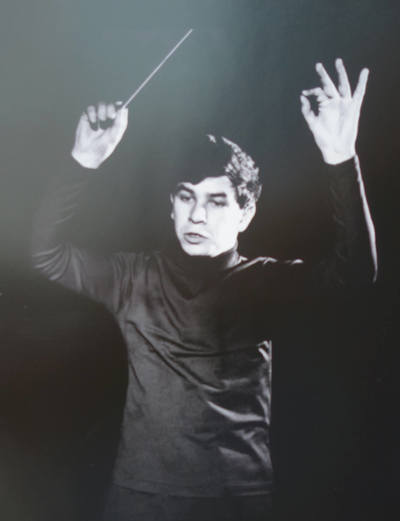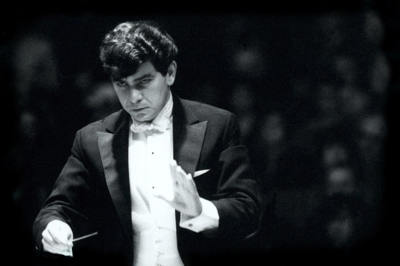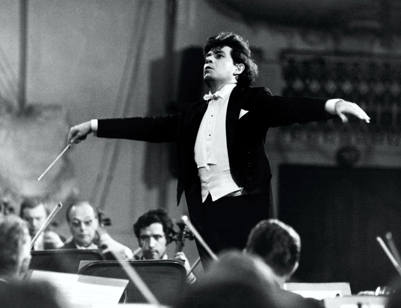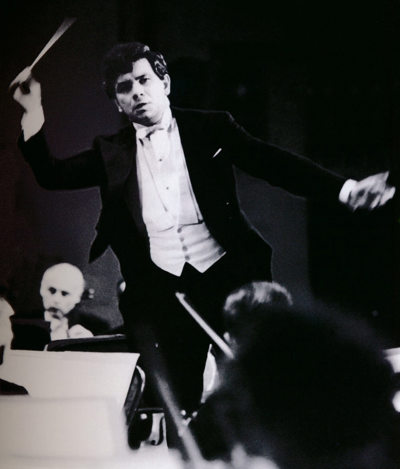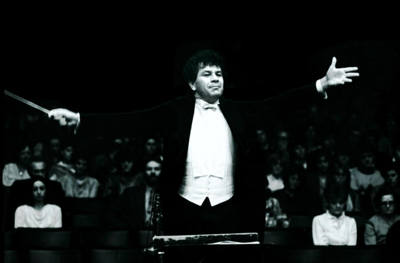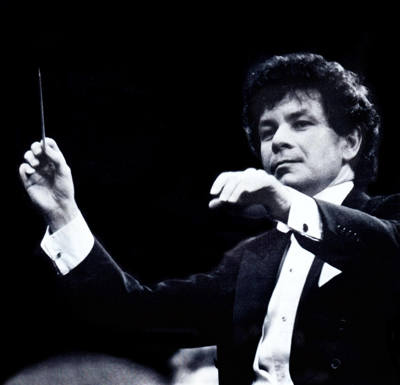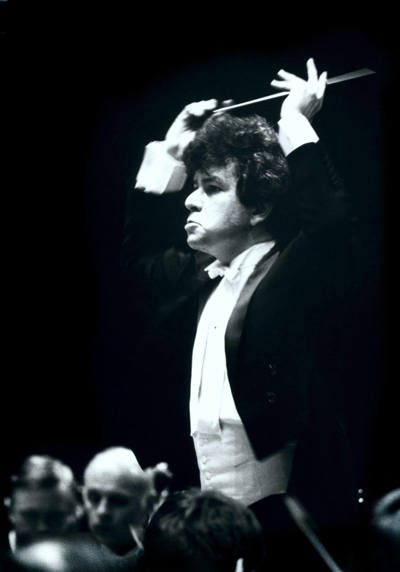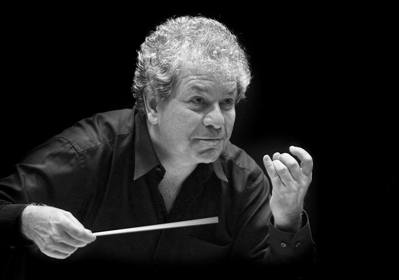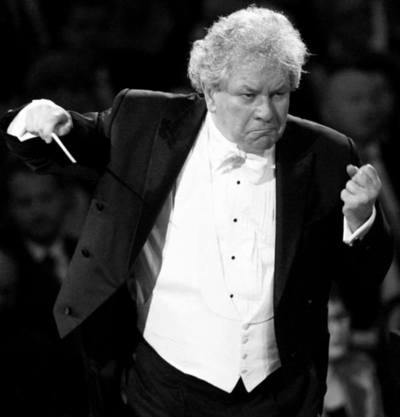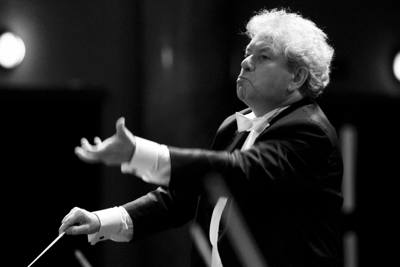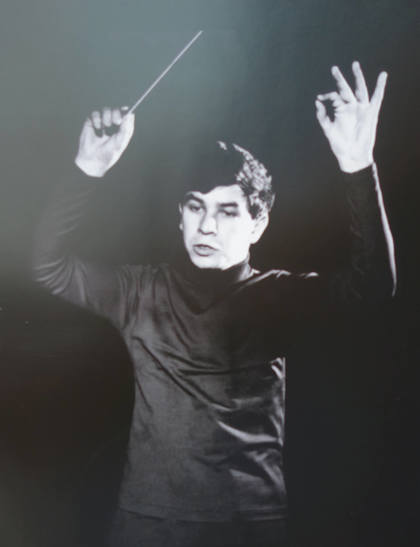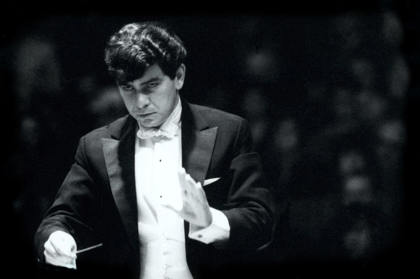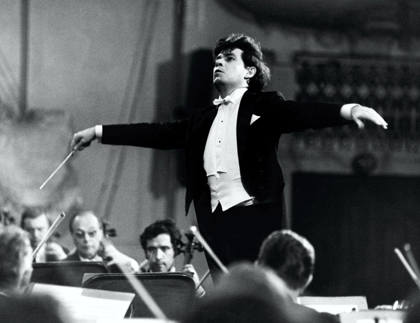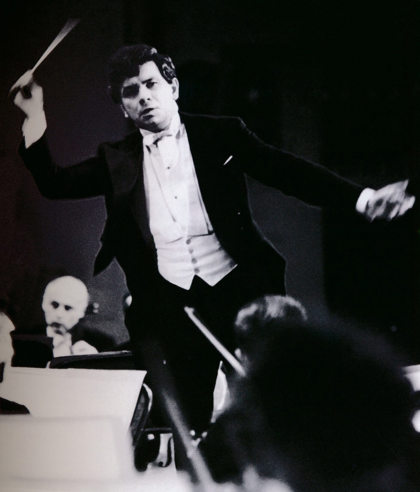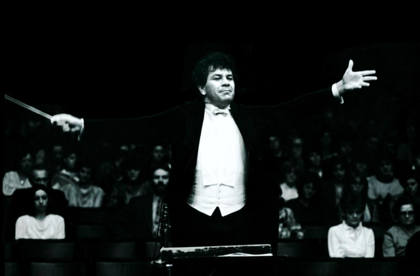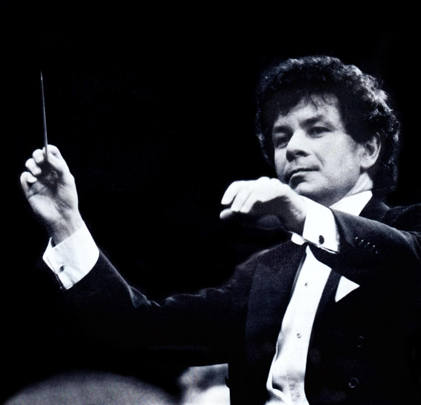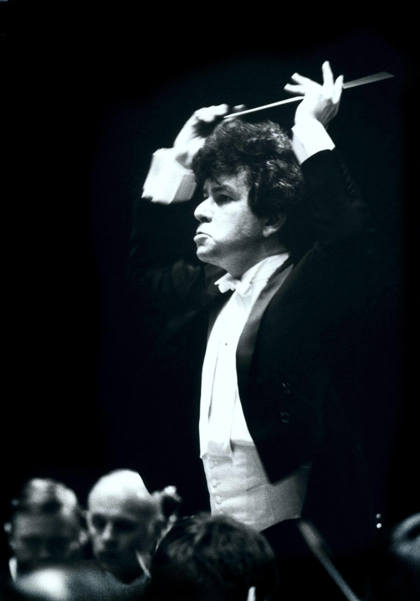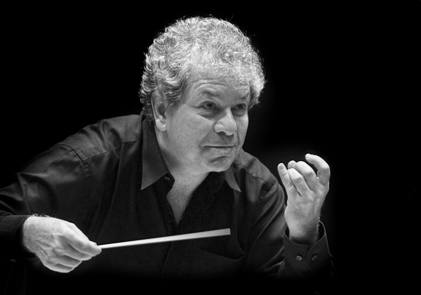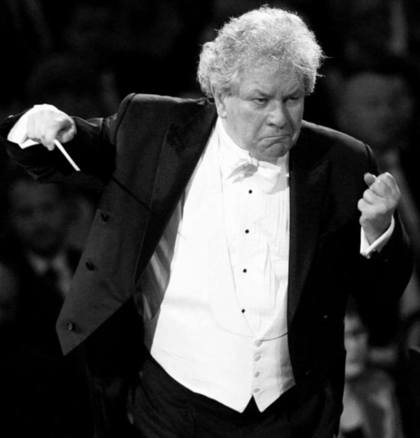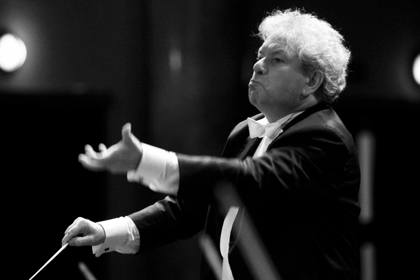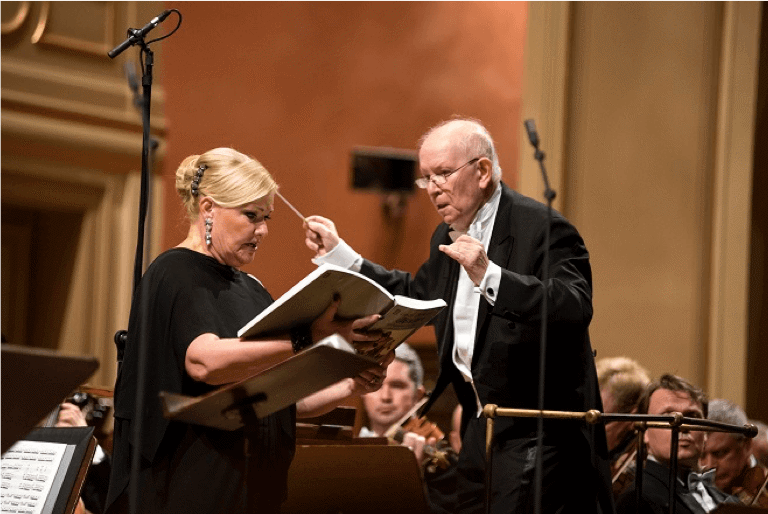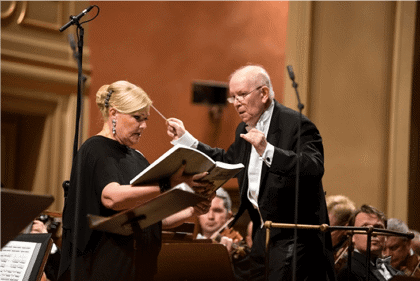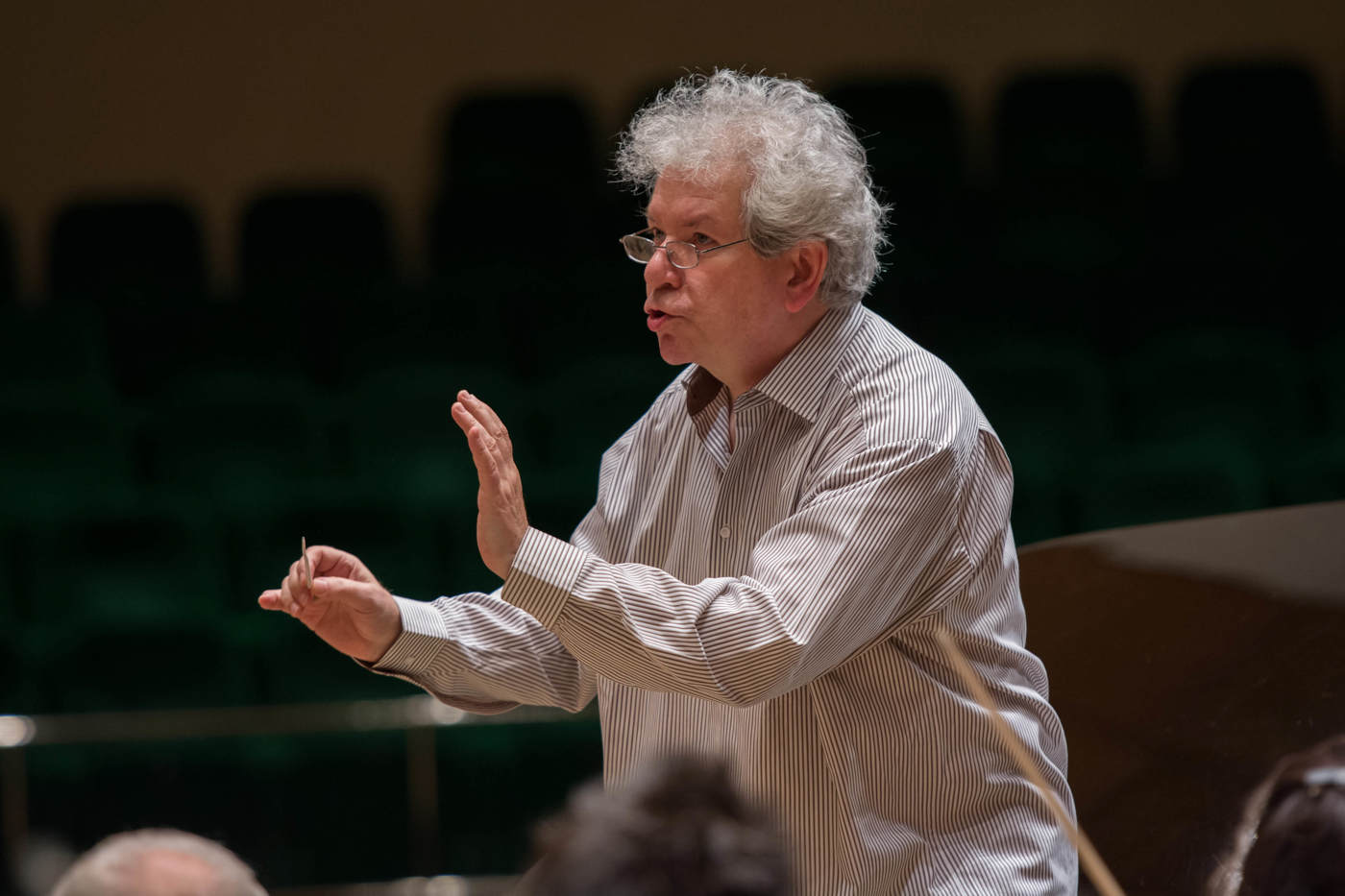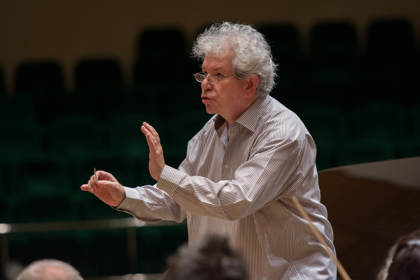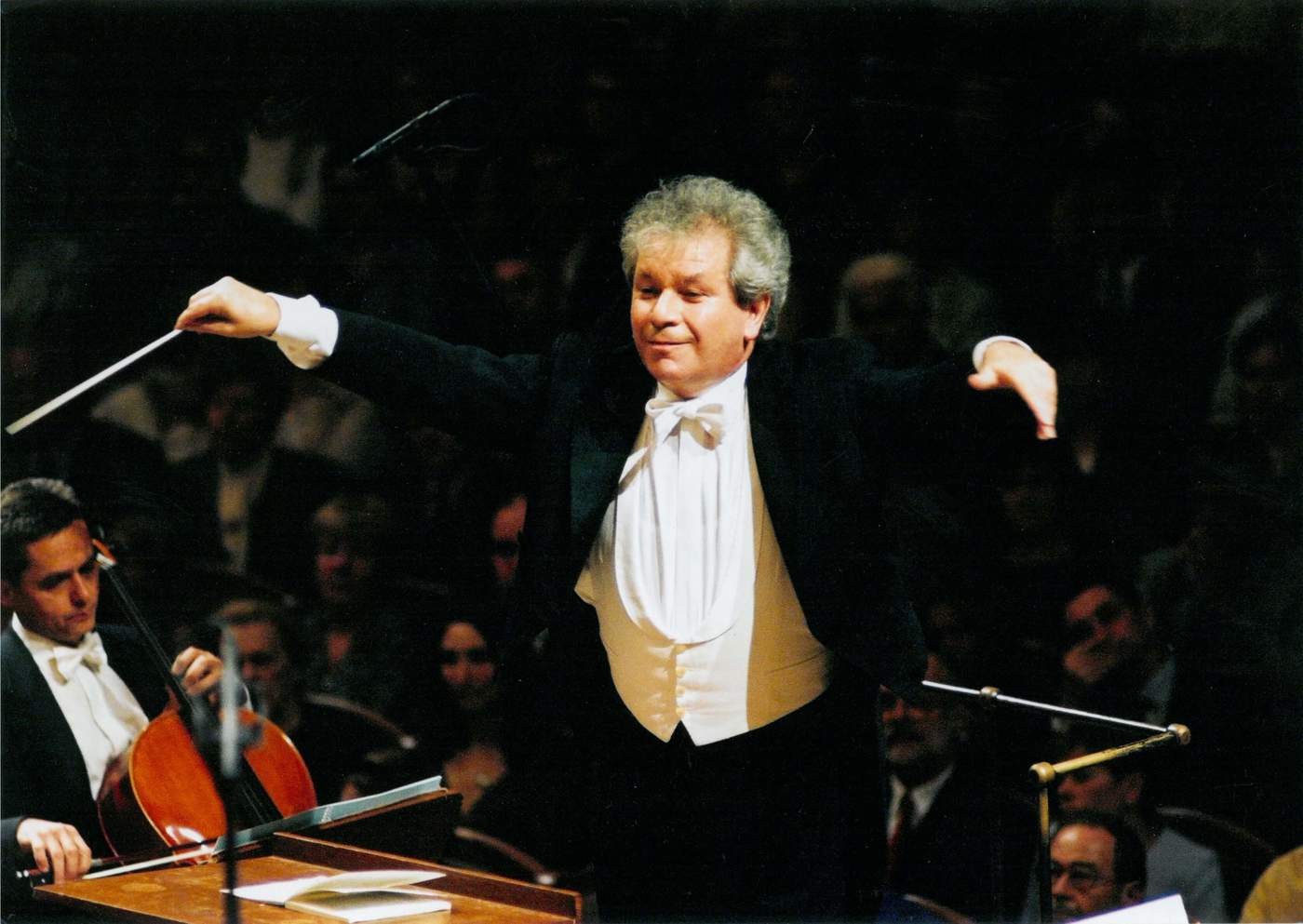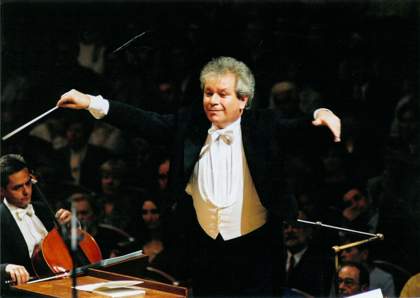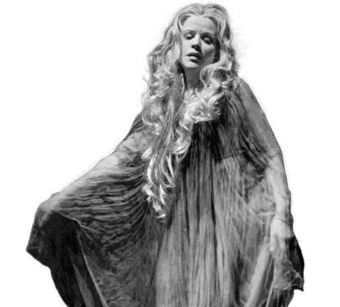“Conducting is my profession. It is a real living love. This means that there are clouds sometimes. I have been through moments when I was wishing this was not what I was doing, wishing that I was doing something else completely, like being a farmer, for instance. But then I was always so happy to return to it. It is enormously exciting and sometimes very dangerous. In short, it is an adventure.”
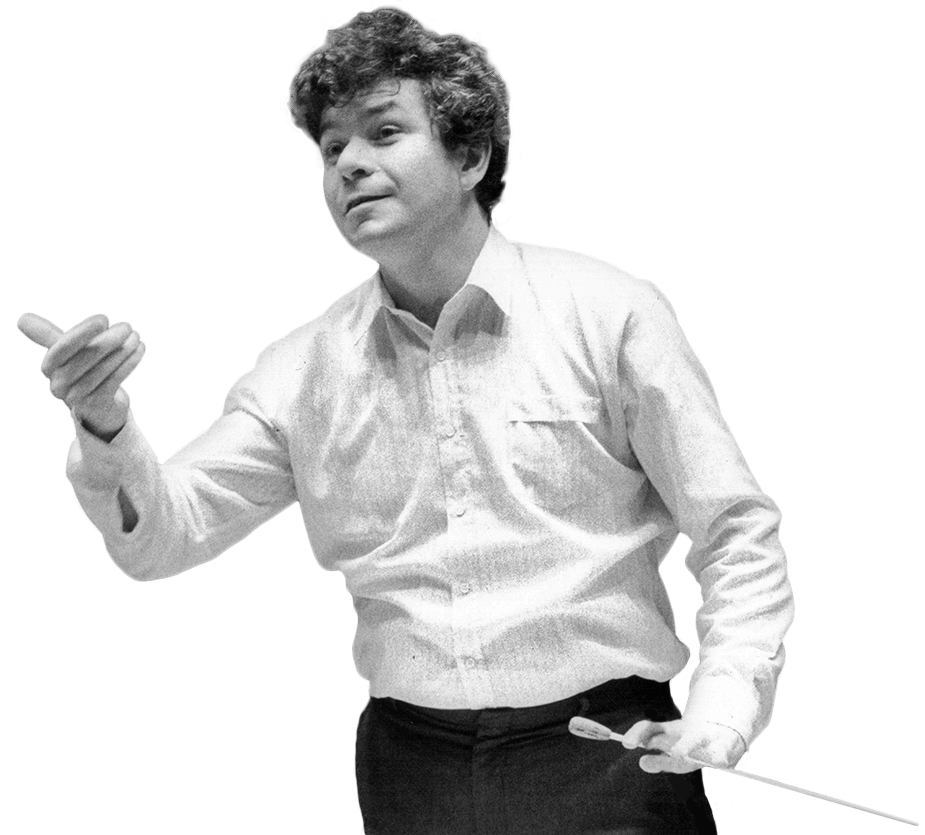
The Type of Conductor
Whoever follows Jiří Bělohlávek’s conducting career must be impressed by the constancy of his methodological approach. He did not change the approach to his profession since he was young, he only became deeper, more thorough, allowing him to achieve increasingly higher interpretation levels with the orchestras he conducted.
Already in a 1969 interview when asked about the foundations of his own professional method, he mentioned three basic principles: thorough study of the composition, accurate reading of the score and intensive and, if possible, long-term work with the orchestra.
For him, interpretation is not only the gift of a moment, mood or zeal, but the deserved outcome of responsible work, a genuine creative need that makes him respect the score with utmost accuracy. (…) Bělohlávek offers the music without the otherwise commonly used bombastic effects included in the programme and without orchestral opulence. He aims directly for the absolute values of music.
His insistence on perfect preparation, however, did not mean a rigid standstill in acquired schemes and solutions practiced in one way to be played the same ever after. Quite the opposite. His engaged attitude to everything he was doing together with the multi-layered musical material was a constant source of new perspectives. So even when conducting compositions that he had performed tens or hundreds of times, he would always find new impulses and new ways to grasp the music.
Music offers unlimited possibilities to understand the composer’s text. Every day, one finds something new in the score. A how many ways there are in which a performer passes over his or her whole experience! The emotions, energy, temperament, character.
Bělohlávek was an exacting conductor, demanding perfect preparation and paying attention to the slightest detail. At the same time, he was able to incorporate all individual parts into the complex of the work and create a compact and impressive whole. His great expertise and professionality, and the truth and intensity of his personal involvement in music were the qualities that made his conducting so convincing and engaging. His demands stayed the same over the years, but as he gathered experience, he learned in time to communicate his ideas the best and most appropriate way, he learned how to convince and inspire the orchestra, how to convey the expected sound quality, rhythm, play etc. both verbally and non-verbally … His verbal communication at rehearsals was interesting as he always tried to convey his requirements with the help of original metaphors and similes. So, the musicians could hear from him that they should play “in a blue way”, or “like a gurgling forest stream”, or to play with the feeling of “a hot bath” etc.
Jiří Bělohlávek’s strong personality is internalised, modest from the outside, fully in service of the works and composers, with a precise gesture and focus on details of sound-making.
As far as Bělohlávek’s conducting technique was concerned, his physical expression was not based on bombastic expressive exclamation, but on service to music and the need for clarity and predictability.
The continuity of the gesture is the ‘miracle’ that makes the conductor’s expression clear and gives the musician the possibility to predict what my hand is going to do the very next moment and therefore to react appropriately.
If I should name two important principles of his work that I considered key and that he expected of us, I would point out constant self-criticism and self-reflection, and the supreme communicative quality of his gestures. (…) He made sure that his every movement communicated something clearly. If there was anything extra, anything unnecessary, he could uncover and identify it immediately.
Sitting in the auditorium, I used to love watching Jiří conducting and to perceive his conducting gestures as something absolutely syncretic with the music. His body, even in minute details his movements expressed the music to the utmost.
A conductor’s gestures should be subordinated to the musical goal – which, however, contains or should contain both levels: a perfect rational understating of the material as well as a presence of creative rapture filled and inspired by freedom.
An attentive colleague
During his career, Bělohlávek met many of the world’s leading instrumental and vocal soloists. Their reactions show Bělohlávek’s exceptional ability of creative collaboration and of considerate and sensitive approach he had to his artistic partners.
It was always a pleasure to work with Jiří Bělohlávek. He was a true musician, and I learned a great deal from him. And I always felt very well, being on stage with him. It is actually very important to sense from the conductor constant encouragement and stimulation for better performance on the one hand, but also support – and that Jiří Bělohlávek could give supremely.
While paying attention to every detail, he was able to adapt to the soloist’s artistic intention. When there was a disagreement on interpretation, he was always trying to find an element, a direction, an interpretation that he and the soloist could share. And in the rare cases when it was not possible to come to an understanding, he supressed his own opinion and complied with the soloist’s version.
He always combined his great demands with great support. He represented a sought-after conductor type, especially for singers, as he knew all parts perfectly and was aware of the position and needs of vocalists in the composition’s whole. Thanks to the singing experience that he gained in the Prague Philharmonic Children’s Choir, he knew exactly when singers needed to breathe or how they could sustain a phrase. He led the vocalists and made the orchestra accompany them sensitively so that their voices were heard well and were not “drowned” in the sound coming from the pit.
Jiří supports and leads in a way that all singers usually only dream about. I cannot imagine anyone do it in a better way. (…) Jiří breathes with you, he understands the music deeply, he is very friendly and approachable. In short, he is the type of person you have always dreamed of collaborating with.
My first collaboration with Jiří Bělohlávek was within the Talents with the Czech Philharmonic programme. (…) And I remember vividly my last collaboration with him. It was in St. Vitus Cathedral, it was cold there, I came without a scarf and Jiří Bělohlávek took off his and put it round my neck.
A caring leader and his team
Jiří Bělohlávek was an artist who believed that the highest performance standards could only be achieved by working with an orchestra on a long-term basis. With a team whose each and every member will work hard for the common result. With an ensemble where everybody knows their position in the whole and where individual musicians perceive each other very well. This is how a creative atmosphere develops, both at rehearsals and concerts, enabling the artists to go beyond what is simply learned and opening the door to improvisation and musical “miracle”. He confessed repeatedly that his ideal of symphonic play is such as if it were a chamber ensemble with a large cast.
…a conductor’s task is not only to serve his career, but especially to serve music itself and the ensembles he works with, as each ensemble needs regular maintenance of all aspects of their playing.
I think that if this profession should make sense, it needs to transform and create a continuous quality, and that can be done only during a long-term collaboration. And in order to be able to do it, it is necessary to support one’s personal charm and input by high-level professionality. And that is a matter of diligence and hard work.
Wherever he held the position of chief conductor and music director, he cared for the orchestra with extraordinary intensity and extensity. His care branched into all areas of the ensemble’s life: interpretation, rehearsals and concerts; musical technique such as caring for intonation, ensemble, tone quality and the richness of the orchestra’s expressive palette; matters concerning dramaturgy and stylistic direction of the ensemble; presentation and promotion of the ensemble, including recordings; building relationships with soloists and other conductors; caring for orchestra members and generational exchange; caring for good working conditions enabling focused work; choice of new musical instruments and other equipment necessary for high quality playing etc. It was not by chance that David Mareček kept returning in his interviews to the fact that Bělohlávek showed everyone at the Rudolfinum what it meant to build an orchestra.
Searching for the form: the power of sanctified interpretation
All this effort extending to many areas of the life of an orchestra came together in the actual artistic work whose climax always was the live performance of a work in front of the audience.
What precedes a concert is, however, a long process. The interpretative approach is formed in the weeks and months when the composition is studied.
In the centre of Bělohlávek’s efforts there was always the score. He was nevertheless also interested in the biographical, social, and cultural context of the origin of the composition, in the tradition of its interpretation, and everything that could help him penetrate to the composition’s core. His utmost attention to the notation made it possible to be loyal to the composer and at the same time come up with a vivid music that mirrored current interpretative potential (orchestra seating arrangement, modern instruments, acoustics of the hall) and respected a modern audience.
Again and again, I experience something beautiful when on the stage with Jiří Bělohlávek. Most importantly, it is the security I feel. The certainty that together we will work, search, and find a form, an expression.
I always build my conception on my detailed analysis of the score, in this way I create my exact idea of the sound form of the work and, subsequently, I try to achieve it with the ensemble.
Following the stage of individual study, several rehearsals usually ensued, during which he tried to convince the musicians for his interpretation and to perform it this way.
In Bělohlávek’s view, the main and final aim of a conductor’s work was the concert. He perceived recordings as a wonderful means conserving the achieved interpretative level and making the work accessible to large audiences, and as a great learning aid and a way to promote the orchestra and the composer. Nevertheless, he found the true essence of music in performing it live.
The momentary combination and interaction of the sound potential of a space, of the orchestra’s play and the mood of the audience create a unique atmosphere that cannot be preserved on any media. Only here and now can the people present witness a unique and unrepeatable artistic performance.
Such a moment is conditioned by the hard work that precedes it and by “getting the composition under one’s skin” so that the intended, rationally led effort and technical skill is complemented by an additional quality that is hard to describe.
And then a happy moment can arise that can open new perspectives. That is the kiss of the Muse. Such a moment cannot be programmed in advance, but when it comes, I feel it with absolute certainty. I know that all partial powers meet in a harmonic whole and also the audience feel that something has happened, that we have touched on something extraordinary, greater than mere technical skill. Why it happens or why it does not is impossible to fathom. This moment I am speaking of is somewhere between heaven and earth, it is not something in our pocket ready to be taken out as we please. It must arise of its own.
Main sources
- 1.
Život dirigenta Jiřího Bělohlávka v pohledu Jana Špáty – v rámci cyklu Genus 1996.
- 2.
ŠTILEC, Jiří: Mezinárodní tribuna mladých umělců. Hudební rozhledy 1975, číslo 5, s. 207–208.
- 3.
KONRÁD, Daniel; KLEPAL, Boris: V hudbě se odhalí jakákoliv charakterová pokřivenost, říká v rozhovoru Jiří Bělohlávek. iHNed.cz 2017, 2. 1. Available online
- 4.
URSÍNOVÁ, Terézie: Impozantní festival. Tvorba 1989, č. 44 (1. 11.), s. 14–15.
- 5.
VEBER, Petr; STEHLÍK, Luboš: Jiří Bělohlávek. Rozhovor k narozeninám. Harmonie 2016, č. 2, s. 4–16. Also available online
- 6.
HAVLÍČEK, Vít: Dirigent Aleš Kománek: Když už se dostanete tak daleko, nemůžete to vzdát. OPERA Plus 2018, 3. 1. Available online
- 7.
Za Jiřím Bělohlávkem. Připravili jsme speciální vysílání a mimořádnou vzpomínkovou besedu s hosty. Český rozhlas Vltava 2017, 1. 6. Available online
- 8.
VEBER, Petr: Jiří Bělohlávek: Imponující je na Britech jejich neochvějná solidnost. Harmonie 2008, č. 6, s. 18–20.
- 9.
SOJKOVÁ, Alena: Talent, nadšení a dřina. Týdeník rozhlas 2018, 11. 1. Available online
- 10.
KUZNIK, Franz: Karita Mattila: Za Jiřím Bělohlávkem bych letěla přes celý svět. iHned 2016, 24. 1. Available online
- 11.
SOJKOVÁ, Alena: Jsem ambiciózní, ale líný. Týdeník rozhlas 2019. 24. 11. Available online
- 12.
VEBER, Petr; STEHLÍK, Luboš: Jiří Bělohlávek. Rozhovor k narozeninám. Harmonie 2016, č. 2, s. 4–16. Also available online
- 13.
Telefonotéka. Český rozhlas Vltava 2016. 14. 1. Available online
- 14.
VÁŇA, Ladislav (scénář a režie): Tenerezza. Filmový dokument. Česká televize 1993.
- 15.
JAROLÍMKOVÁ, Hana: S Jiřím Bělohlávkem o výsledcích i dalších projektech. Hudební rozhledy 1996, číslo 6, s. 2–5.
- 16.
PLAVCOVÁ, Alena: Jiří Bělohlávek: Maestro. Pátek – Magazín Lidových novin 2006, č. 16, s. 4–10.
Život dirigenta Jiřího Bělohlávka v pohledu Jana Špáty – v rámci cyklu Genus 1996.
ŠTILEC, Jiří: Mezinárodní tribuna mladých umělců. Hudební rozhledy 1975, číslo 5, s. 207–208.
KONRÁD, Daniel; KLEPAL, Boris: V hudbě se odhalí jakákoliv charakterová pokřivenost, říká v rozhovoru Jiří Bělohlávek. iHNed.cz 2017, 2. 1. Available online
URSÍNOVÁ, Terézie: Impozantní festival. Tvorba 1989, č. 44 (1. 11.), s. 14–15.
VEBER, Petr; STEHLÍK, Luboš: Jiří Bělohlávek. Rozhovor k narozeninám. Harmonie 2016, č. 2, s. 4–16. Also available online
HAVLÍČEK, Vít: Dirigent Aleš Kománek: Když už se dostanete tak daleko, nemůžete to vzdát. OPERA Plus 2018, 3. 1. Available online
Za Jiřím Bělohlávkem. Připravili jsme speciální vysílání a mimořádnou vzpomínkovou besedu s hosty. Český rozhlas Vltava 2017, 1. 6. Available online
VEBER, Petr: Jiří Bělohlávek: Imponující je na Britech jejich neochvějná solidnost. Harmonie 2008, č. 6, s. 18–20.
SOJKOVÁ, Alena: Talent, nadšení a dřina. Týdeník rozhlas 2018, 11. 1. Available online
KUZNIK, Franz: Karita Mattila: Za Jiřím Bělohlávkem bych letěla přes celý svět. iHned 2016, 24. 1. Available online
SOJKOVÁ, Alena: Jsem ambiciózní, ale líný. Týdeník rozhlas 2019. 24. 11. Available online
VEBER, Petr; STEHLÍK, Luboš: Jiří Bělohlávek. Rozhovor k narozeninám. Harmonie 2016, č. 2, s. 4–16. Also available online
Telefonotéka. Český rozhlas Vltava 2016. 14. 1. Available online
VÁŇA, Ladislav (scénář a režie): Tenerezza. Filmový dokument. Česká televize 1993.
JAROLÍMKOVÁ, Hana: S Jiřím Bělohlávkem o výsledcích i dalších projektech. Hudební rozhledy 1996, číslo 6, s. 2–5.
PLAVCOVÁ, Alena: Jiří Bělohlávek: Maestro. Pátek – Magazín Lidových novin 2006, č. 16, s. 4–10.
